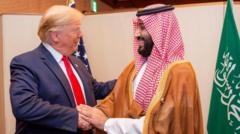The article discusses President Trump's arrival in Saudi Arabia, his emphasis on business agreements, and contrasting reactions regarding U.S.-Saudi relations during his administration compared to Biden’s.
**Trump Begins Gulf Tour as a Symbol of Renewed Diplomatic Ties with Saudi Arabia**

**Trump Begins Gulf Tour as a Symbol of Renewed Diplomatic Ties with Saudi Arabia**
President Trump embarks on a significant Gulf tour, highlighting business deals and partnerships with Saudi Arabia, Qatar, and the UAE amidst varying international perceptions and reactions.
President Trump has launched a four-day tour of the Gulf region, marking his first major international trip of his second term as he aims to bolster U.S. philanthropic and business ties with Saudi Arabia, Qatar, and the United Arab Emirates. On Tuesday morning, the president arrived in Riyadh, greeted warmly by Crown Prince Mohammed bin Salman, a sign of the camaraderie that has grown between Trump and the Saudi leadership, particularly in light of their shared economic interests.
The visit comes as Trump looks to secure deals exceeding $1 trillion, focusing on investments in tech and energy sectors, alongside arms sales. He arrived at King Khalid International Airport in a VIP section, stepping onto a lavish lavender carpet, indicative of the ceremonial attention he enjoys, unlike the relatively muted reception during President Biden's controversial visit in 2022. This backdrop presents a sharp contrast in diplomatic rapport between the two administrations, underscoring Biden's earlier denouncement of Saudi Arabia in favor of human rights issues.
During the tour, Trump is expected to speak at an investment forum attended by major U.S. business leaders. The guest list includes prominent figures from notable firms like IBM and BlackRock, illustrating the merger of politics and business interests. Intriguingly, the trip aligns closely with the financial endeavors of Trump's family, as they anticipate receiving a luxury 747 aircraft from Qatari royalties, a gesture that would represent an unprecedented foreign gift to the U.S. government.
As the trip progresses, the implications for U.S. economic policy and military strategy in the Middle East remain a pertinent point of analysis. Critics, including advocates for human rights and international relations, express concerns regarding Trump's business engagements and the potential repercussions for humanitarian considerations.
In Washington, concurrent to Trump's trip, House Republicans are proposing severe reductions to the food stamp program, targeting millions of low-income families and reflecting a divisive approach to economic assistance which runs alongside the president's foreign economic strategies. This juxtaposition raises questions about domestic priorities versus international relations, highlighting the complex dynamics that characterize modern governance.
Overall, Trump's Gulf tour signifies a strategic engagement aimed at revitalizing old alliances while navigating a landscape filled with challenges related to democracy, human rights, and economic policies. The outcomes of this visit will likely reverberate in both domestic and international arenas as Trump continues to advocate for business interests as a cornerstone of U.S. relations in the Gulf.





















